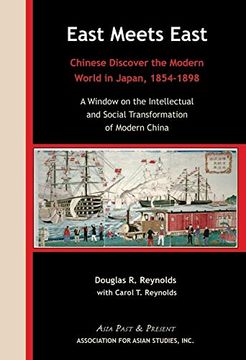Share
East Meets East: Chinese Discover the Modern Wold in Japan, 1854-1898. A Window on the Intellectual and Social Transformation of Modern China (Asia Past & Present)
Douglas R. Reynolds (Author)
·
Assn For Asian Studies Inc
· Paperback
East Meets East: Chinese Discover the Modern Wold in Japan, 1854-1898. A Window on the Intellectual and Social Transformation of Modern China (Asia Past & Present) - Douglas R. Reynolds
Choose the list to add your product or create one New List
✓ Product added successfully to the Wishlist.
Go to My Wishlists
Origin: U.S.A.
(Import costs included in the price)
It will be shipped from our warehouse between
Thursday, May 30 and
Monday, June 17.
You will receive it anywhere in United Kingdom between 1 and 3 business days after shipment.
Synopsis "East Meets East: Chinese Discover the Modern Wold in Japan, 1854-1898. A Window on the Intellectual and Social Transformation of Modern China (Asia Past & Present)"
Through the lives of Chinese diplomats and their careers, East Meets East explores three important dimensions of modern Chinese history: Chinese discovery of the modern world in Japan; reports on Japan suppressed by higher authorities because of their insistent objectivity and non-Sinocentric perspective; and state-sponsored innovations to meet crises which opened the gates to intellectual and social transformations at the grassroots. Meaty reports on Japan directly informed the Hundred Days Reforms of 1898 while, inside China since 1861, extrabureaucratic government Ju (Bureaus)industrial arsenals, navy yards, translation bureaus and schools, mines, shipping, textiles, telegraphy, and railroadsdemanded the talents of irregular path (yitu) persons having new knowledge distinct from regular path (zhengtu) bureaucrats. Against this background it becomes much clearer why the Xinzheng modernization reforms after 1901 took hold and why after 1912 elites old and new rejected Yuan Shikais bid to restore the imperial order in 191516. After 1916, there was no going back. The old order and era were truly gone with the wind.
- 0% (0)
- 0% (0)
- 0% (0)
- 0% (0)
- 0% (0)
All books in our catalog are Original.
The book is written in English.
The binding of this edition is Paperback.
✓ Producto agregado correctamente al carro, Ir a Pagar.

